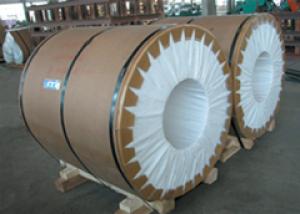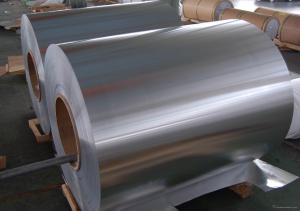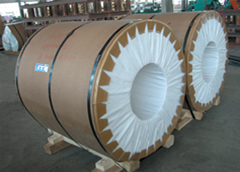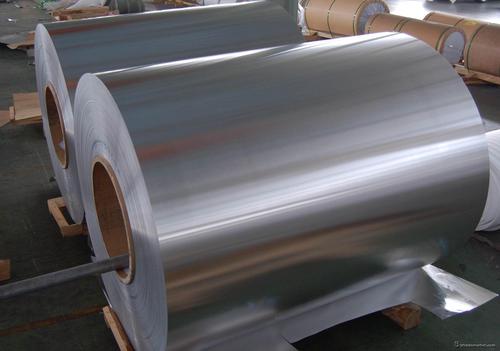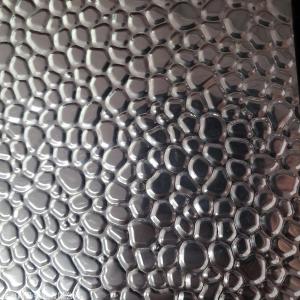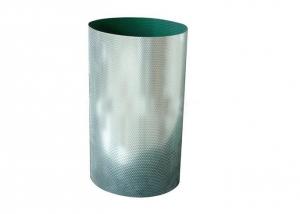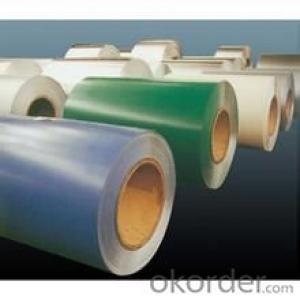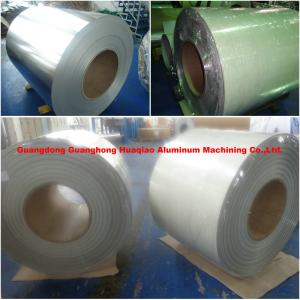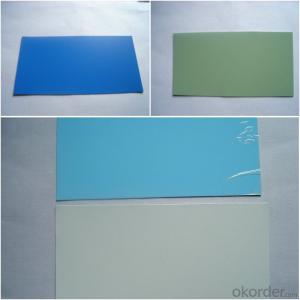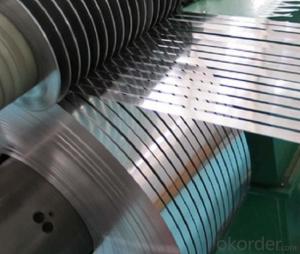Smooth Surface Embossed Aluminum Coil
- Loading Port:
- China Main Port
- Payment Terms:
- TT OR LC
- Min Order Qty:
- -
- Supply Capability:
- -
OKorder Service Pledge
Quality Product, Order Online Tracking, Timely Delivery
OKorder Financial Service
Credit Rating, Credit Services, Credit Purchasing
You Might Also Like
Alloy: AA 5052
Temper:H14/16/18/22/24/32,HO etc.
Thickness:0.2mm—100mm
Width:100mm—2300mm (Can be slitted)
InnerDiameter: 508MM
CoilWeight:500kg-3000kg(Max.)
Application: Foil stock, Circles, Roofing, Canstock, Marine plate,Anti-sliperypurpose in vehicles, packing and appliance.
- Q: How to deal with too much aluminum powder in aluminum striping?
- Currently, there are bag dust-removal system and water dust-removal system. The former is very popular with enterprises because of low maintenance cost, accounting for over 90%. But the problem is the dust accumulation because the ventilation and dust removal systems are not produced in strict accordance with the standard. For example, controlling wind speed does not meet the requirement; ventilation and dust removal system does not meet the requirements of explosion-proof, including the set of pipes, series and parallel connection, the choice of dust removal system, the spark detection and extinguishing measures.
- Q: What are the necessary safety measures one should take while using aluminum coils in a kitchen setting?
- <p>When using aluminum coil in a kitchen, safety precautions include: 1) Ensuring proper ventilation to avoid inhaling fumes, as aluminum dust can be harmful. 2) Wearing protective gear such as gloves and goggles to protect your skin and eyes from potential contact with aluminum or sharp edges. 3) Handling the aluminum coil carefully to prevent cuts or injuries. 4) Avoiding contact with acidic or alkaline substances, as aluminum can react with them. 5) Not using aluminum coil near open flames or high heat sources, as it can melt or cause fires. 6) Cleaning up any aluminum dust or debris promptly to prevent slipping hazards. 7) Storing aluminum coils in a dry, cool place away from chemicals and heat sources.</p>
- Q: This question asks for a comparison between aluminum coil and iron coil, highlighting their distinct properties and uses.
- <p>Aluminum coil and iron coil differ in several aspects. Aluminum coil is lightweight, corrosion-resistant, and has excellent electrical and thermal conductivity, making it ideal for electrical wiring, heat sinks, and food packaging. Iron coil, on the other hand, is heavier, stronger, and more durable, commonly used in construction, automotive, and heavy machinery due to its high tensile strength. Iron also has magnetic properties, useful in applications like transformers and electromagnets. While aluminum is non-magnetic, it is more cost-effective and has better recyclability compared to iron.</p>
- Q: Are aluminum coils suitable for architectural roofing systems?
- Yes, aluminum coils are suitable for architectural roofing systems. Aluminum is lightweight, durable, and corrosion-resistant, making it an excellent choice for roofs. It can withstand harsh weather conditions, is easy to work with, and offers a range of design possibilities. Additionally, aluminum coils are available in a variety of colors and finishes, allowing for customization and enhancing the aesthetic appeal of architectural roofing systems.
- Q: What are the differences between aluminum coil 3003h24 and 3a21h14?
- The mechanical property references of rolled plate 3003 H24and 3A21 H14 are as follows: 3003 H24--Rm/MPa≧140-180;Rp0.2/MPa≧115;A(%)≧1-5(thickness 0.2mm-4.5mm)3A12 H14--Rm/MPa≧145-215;A(%)≧6
- Q: What are the different alloys used for aluminum coils?
- Aluminum coils utilize several different alloys, each possessing unique properties and applications. Some commonly employed alloys encompass: 1. 1100 Alloy: A pure aluminum alloy that boasts exceptional corrosion resistance and high thermal conductivity. It finds frequent usage in scenarios necessitating elevated thermal or electrical conductivity, such as heat exchangers or electrical conductors. 2. 3003 Alloy: A versatile aluminum alloy offering commendable resistance against atmospheric corrosion and moderate strength. It is commonly employed in situations requiring moderate strength and formability, like packaging, roofing, or vehicle parts. 3. 5052 Alloy: Among the strongest non-heat-treatable aluminum alloys, this alloy exhibits top-notch corrosion resistance and favorable formability. It frequently finds application in marine environments, automotive components, and household appliances. 4. 6061 Alloy: A heat-treatable aluminum alloy renowned for its exceptional strength and corrosion resistance. It is often utilized in structural capacities, such as aircraft components, marine hardware, or bicycle frames. 5. 7075 Alloy: A high-strength aluminum alloy recognized for its outstanding fatigue strength. It is commonly employed in aerospace and military scenarios, as well as in high-stress structural elements. These examples represent merely a fraction of the diverse array of alloys employed for aluminum coils. The selection of a specific alloy depends on the desired properties and intended application of the coil.
- Q: What is the difference between hot rolled and cold rolled aluminum coils?
- The main difference between hot rolled and cold rolled aluminum coils lies in their production process and the resulting properties of the final product. Hot rolled aluminum coils are produced by heating aluminum ingots above their recrystallization temperature, typically around 450°C (842°F), and then rolling them through a series of rollers to reduce their thickness and shape them into coils. This process allows for quick production and the ability to produce larger coils. However, hot rolling can lead to a less precise and less smooth surface finish, with potential for surface defects and oxidation. On the other hand, cold rolled aluminum coils are produced by further processing hot rolled coils. The hot rolled coils are first pickled, or chemically treated, to remove any mill scale or impurities. They are then cold rolled, which involves passing them through a series of rollers at room temperature. This process results in a more precise and smoother surface finish, with excellent dimensional accuracy and tighter tolerances. Cold rolling also increases the strength and hardness of the aluminum, making it more suitable for certain applications. In terms of properties, hot rolled aluminum coils generally have lower strength and hardness compared to cold rolled coils. They also have a higher likelihood of surface defects and oxidation due to the high temperature involved in the production process. Cold rolled aluminum coils, on the other hand, exhibit higher strength and hardness, as well as better surface finish and dimensional accuracy. These properties make cold rolled aluminum coils more suitable for applications that require higher quality and precision. Overall, the choice between hot rolled and cold rolled aluminum coils depends on the specific requirements of the end-use application. Hot rolled coils are often used in applications where speed and cost-effectiveness are prioritized, while cold rolled coils are preferred for applications that demand higher quality, precision, and strength.
- Q: Are aluminum coils resistant to fire?
- Yes, aluminum coils are generally considered to be resistant to fire. Aluminum has a high melting point of 660 degrees Celsius, which is significantly higher than the average temperature of most household fires. This makes aluminum coils a popular choice for various applications where fire resistance is required, such as in the construction of buildings, electrical systems, and automotive components. Additionally, aluminum has a low flammability and does not produce toxic fumes when exposed to fire, further enhancing its fire-resistant properties. However, it is important to note that the fire resistance of aluminum coils can vary depending on the specific alloy used and the thickness of the coil. Therefore, it is always recommended to consult with experts or refer to industry standards to ensure the appropriate fire safety measures are taken.
- Q: Are aluminum coils suitable for automotive applications?
- Yes, aluminum coils are suitable for automotive applications. Aluminum is a lightweight material that offers several advantages for automotive use. It provides excellent thermal conductivity, which allows for efficient heat transfer and cooling within the vehicle. Additionally, aluminum is corrosion-resistant, making it ideal for automotive applications where exposure to moisture and various weather conditions is common. Moreover, aluminum coils have high strength-to-weight ratio, meaning they provide strength and durability while keeping the weight of the vehicle low. This is particularly beneficial for improving fuel efficiency and reducing emissions. Furthermore, aluminum coils can be easily formed and shaped into various automotive components, such as heat exchangers, radiators, condensers, and evaporators, making them versatile and suitable for a wide range of automotive applications.
- Q: How can aluminium ingots be processed into aluminium coils (aluminium sheets)?
- This depends on what kind of ingot, and if it is small, it needs to be melted into a furnace, cast into a large plate, and then rolled on a mill
Send your message to us
Smooth Surface Embossed Aluminum Coil
- Loading Port:
- China Main Port
- Payment Terms:
- TT OR LC
- Min Order Qty:
- -
- Supply Capability:
- -
OKorder Service Pledge
Quality Product, Order Online Tracking, Timely Delivery
OKorder Financial Service
Credit Rating, Credit Services, Credit Purchasing
Similar products
Hot products
Hot Searches
Related keywords
